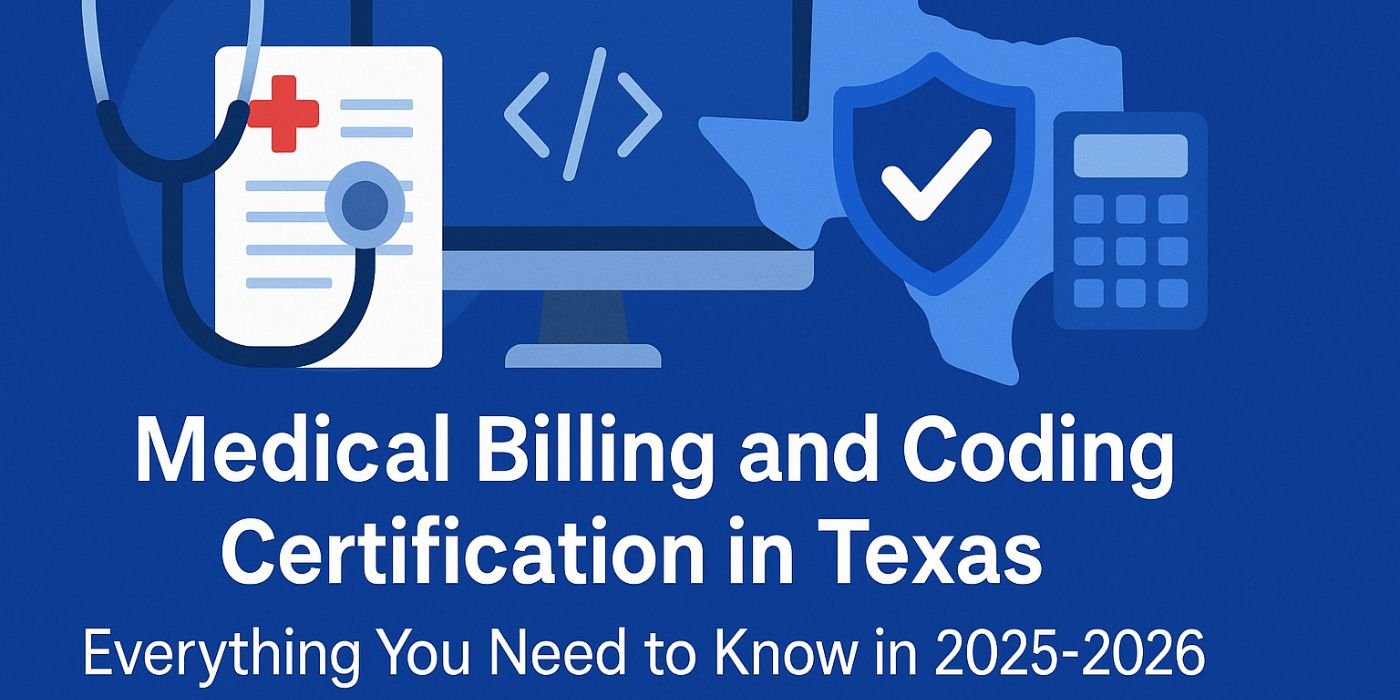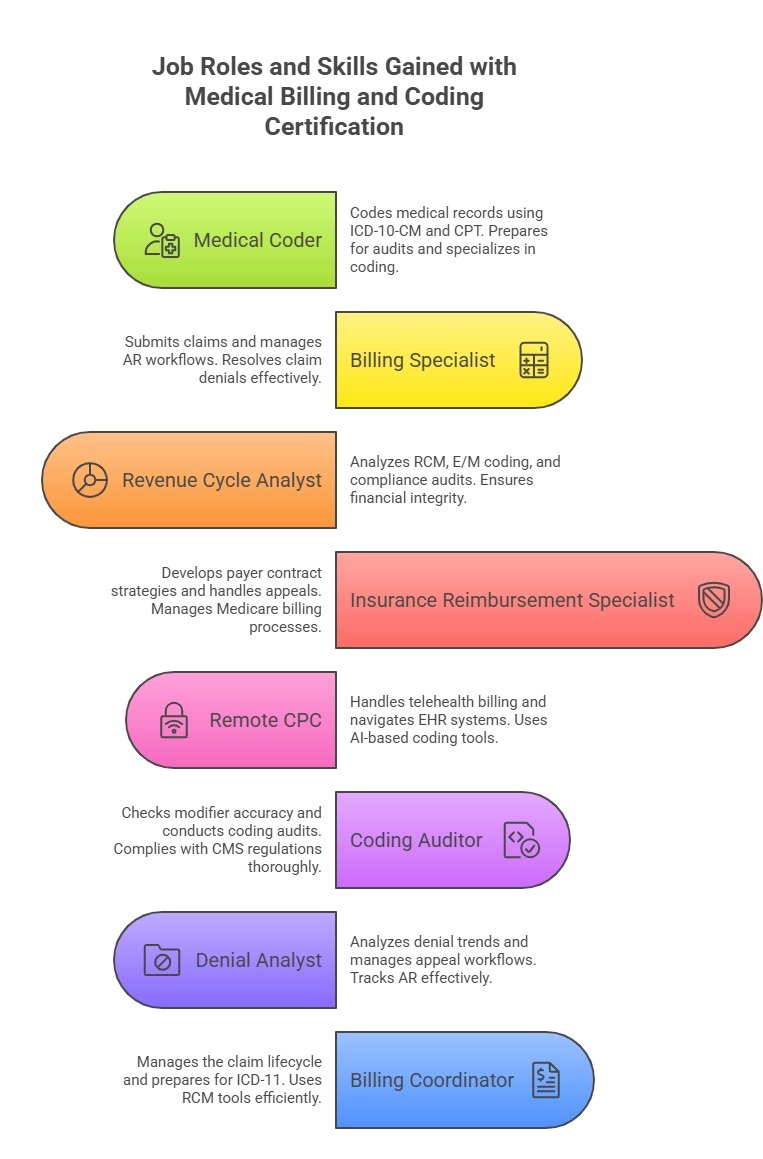Medical Billing and Coding Certification in Texas: Everything You Need to Know in 2025-2026
Getting certified in medical billing and coding in Texas isn’t optional anymore—it’s the bare minimum if you want a real healthcare career. Whether you’re eyeing roles in Houston hospitals, Dallas insurance networks, or remote billing positions across the state, uncredentialed applicants are filtered out before the interview. But with the right certification, you can unlock job roles with better pay, job security, and direct access to coding systems that manage everything from ICD-10 to value-based billing.
Texas employers now demand professionals with Medical Billing and Coding certifications, especially those trained in advanced revenue cycle management, denial prevention, AI-assisted billing tools, and payer compliance. The result? Certified coders consistently earn $12K–$18K more per year and are often prioritized for leadership-track roles. This isn’t just skill-building—it’s positioning yourself as the first choice in a saturated market. If you’re still stuck doing admin-level tasks with no path forward, a high-level medical billing and coding certification isn’t just an upgrade. It’s your gateway to becoming indispensable.
What Is Medical Billing and Coding Certification in Texas Exactly? Skills Required and Jobs Explained
A Medical Billing and Coding Certification in Texas formally qualifies you to handle clinical documentation, translate diagnoses into billable codes, and navigate payer systems to ensure compliant and accurate reimbursement. The role isn’t just data entry—it’s regulatory, financial, and clinical alignment at the front lines of healthcare revenue. A dual certification from AMBCI prepares you for both front-end patient billing and back-end coding integrity, across private clinics, hospitals, and insurance partners statewide.
Core Skills You’ll Master in a Texas-Based Medical Billing and Coding Certification
ICD-10-CM, CPT®, and HCPCS Level II coding
Electronic health record (EHR) navigation & modifier usage
Evaluation and Management (E/M) coding
Telehealth and value-based billing workflows
CMS regulations, Medicare/Medicaid coding standards
Denial management, AR workflows, and appeals
Payer policy interpretation and contract compliance
ICD-11 transition planning and global package applications
AI-integrated billing tools and real-time audit readiness
Mastery of specialty coding: Cardiology, Oncology, Psychiatry, Pediatrics
Top Job Roles You Qualify For with Medical Billing and Coding Certification
Medical Coder – Houston Methodist, Baylor Scott & White Health
Billing Specialist – UnitedHealth Group, HCA Healthcare
Revenue Cycle Analyst – Texas Health Resources, CHRISTUS Health
Insurance Reimbursement Specialist – Blue Cross Blue Shield of Texas
EHR Coding Auditor – Dell Children's Medical Center, MD Anderson
Remote Certified Professional Coder (CPC) – Molina Healthcare, Conifer Health
Denial Resolution Analyst – Tenet Health, Memorial Hermann
Healthcare Billing Coordinator – Humana, Ascension Texas
Why Should You Get Medical Billing and Coding Certification to Work in Texas?
Texas employers aren’t just recommending certification—they’re requiring it. Whether you're targeting hospitals in Houston or insurance providers in Dallas, uncredentialed applicants are auto-rejected for most billing or coding roles. With AMBCI’s Medical Billing and Coding Certification, you qualify for dual roles across coding and billing —giving you full control of the revenue cycle. Certified professionals in Texas see $12K–$18K higher starting salaries, immediate access to remote positions, and better retention during layoffs. Without certification, you’re capped at entry-level admin pay with no coding system access, no compliance authority, and no growth.
| Career Factor | Without Certification | With AMBCI Certification |
|---|---|---|
| Starting Salary (Annual) | $28,000 – $36,000 | $42,000 – $58,000 |
| Eligibility for Coding Roles | No (Admin tasks only) | Yes (Inpatient, outpatient, specialty coding) |
| Promotion Pathway | Flat — limited to office support | Clear track to analyst, senior coder, RCM lead |
| Access to Remote Jobs | Low to none | High — especially with payers and EHR vendors |
| Job Stability | Low (uncredentialed = replaceable) | High (certified professionals retained longer) |
| Compliance Readiness | None—on-the-job learning only | Trained on CMS, HIPAA, ICD-10/ICD-11, CPT® standards |
Which Certification Should You Choose to Become a Medical Billing and Coding Specialist in Texas?
There are dozens of billing and coding certifications available online—but most fall short when it comes to depth, relevance, or long-term ROI. Some only cover coding (CPC®), some stop at billing (CPB®), and others have outdated material with no direct link to job-readiness. If you're serious about making a career out of it in Texas, choose a program that delivers dual-certification, real-world coding exposure, and built-in placement pathways.
AMBCI’s Medical Billing and Coding Certification stands out not because of marketing—but because it stacks CPC® + CPB®, includes 223+ specialty modules, and mirrors Texas-specific employer needs with hands-on workflows and expert-led sessions.
| Feature | Typical Providers | AMBCI’s Medical Billing and Coding Certification |
|---|---|---|
| Accreditation | May offer CPC or CPB only (not both) | Dual AAPC credentials (CPC® + CPB®) + CPD-accredited |
| Curriculum Depth | 80–150 lessons, limited specialties | 223+ specialty modules + 500 real-world cases & simulations |
| Career Support | Downloadable certificate, no job assistance | Job placement accelerator, resume toolkit, LinkedIn review |
| Training Format | Self-paced only | Flexible: 8–16 week bootcamp or 3–6 month self-paced |
| Instructor Access | No mentorship, pre-recorded only | Live coding reviews, 1-on-1 tutor onboarding |
| Compliance & Tech Skills | No ICD-11, AI, or RCM system training | Includes ICD-11 prep, AI tools, CMS updates, RCM workflows |
| Transparency & Team | No visibility into instructors or curriculum team | Curriculum built by experienced coders—no celebrity gimmicks |
Why AMBCI’s Medical Billing and Coding Certification Will Be a Game Changer for Your Career in Texas
The financial impact of getting certified in Texas isn’t hypothetical—it’s immediate and measurable. Coders and billers without certification often max out below $36K in stagnant, support-level roles. But once you complete AMBCI’s Medical Billing and Coding Certification, you enter an entirely different salary band. You don’t just get access to higher-paying roles—you become eligible for promotion pipelines and remote flexibility that unlicensed staff never see. The chart below breaks down what this shift looks like in real job markets across Texas.
Summarizing All You Need to Know About Getting Your Medical Billing and Coding Certification in Texas
If you’re serious about entering Texas’s fast-evolving healthcare workforce, a certification isn’t optional—it’s your entry ticket. AMBCI’s Medical Billing and Coding Certification gives you dual credentials (CPC® + CPB®), 223+ specialty modules, and job-ready training in ICD-10, E/M, RCM, telehealth, and denial management. Whether you want a role at MD Anderson, Baylor, or remotely from anywhere in Texas, this one certification upgrades your career, salary, and long-term positioning. Below is a summary of why it’s the right choice.
| Factor | AMBCI Advantage |
|---|---|
| Certification Name | Medical Billing and Coding Certification (CPC® + CPB®) |
| Credentialing Body | AAPC + CPD Accreditation |
| Curriculum Depth | 223+ specialties, ICD-10, CPT®, HCPCS, AI billing tools |
| Delivery Format | 8–16 week bootcamp or 3–6 month self-paced online |
| Support Provided | 1-on-1 onboarding, live coding reviews, mentor access |
| Job Placement | Built-in career accelerator, resume toolkit, LinkedIn help |
| Who It’s For | HS/GED graduates ready to start coding in Texas healthcare |
Frequently Asked Questions
-
In Texas, most learners complete the program in 8–16 weeks (bootcamp) or 3–6 months (self-paced). AMBCI’s structure works whether you’re in Houston full-time or studying remotely from West Texas. Both tracks offer the same AAPC-aligned curriculum, live coding sessions, and 1-on-1 tutor onboarding. You’ll cover over 223 medical specialties and complete live simulations to prepare for the CPC® and CPB® exams. Fast-track students typically secure jobs within a month of completion, thanks to built-in resume support and job placement resources tailored to Texas markets. Whether you’re aiming for a hospital role in Dallas or a remote billing job, the flexible timeline ensures you stay on track without compromising quality.
-
Yes. AMBCI’s Medical Billing and Coding Certification is recognized across all major Texas healthcare employers—including HCA Healthcare, Baylor Scott & White, Houston Methodist, and Texas Health Resources. It includes dual AAPC credentials (CPC® + CPB®) and CPD accreditation, meeting both national and local standards. Texas facilities hiring coders or billers often filter applicants by certification first. Without CPC® or CPB® credentials, you’re ineligible for roles involving payer compliance or RCM. With this certification, you’re not just eligible—you’re preferred. AMBCI grads also stand out in Texas's competitive job boards because their training includes denial workflows, AI-based billing, and real-world specialty coding simulations.
-
The Texas version of AMBCI’s certification covers over 223 specialties, including those in high demand locally—cardiology, pediatrics, urgent care, geriatrics, psychiatry, oncology, and neurology. This ensures you're not just learning theory—you’re gaining role-relevant knowledge tied to job listings across Texas. Modules are based on real RCM workflows used by providers like MD Anderson and UnitedHealth Group. You’ll get simulations and MCQs based on actual claim scenarios, not generic examples. This localized depth is what makes AMBCI ideal for those applying in major metro areas or smaller clinics needing coders fluent in both general and specialized billing paths.
-
Absolutely. AMBCI’s Medical Billing and Coding Certification is one of the few programs that directly supports remote placement pathways in Texas. You’ll be qualified for remote roles with insurance payers (like Aetna, Cigna, and BCBS Texas), billing vendors, and even multi-site hospital systems like Tenet and HCA. With dual CPC® + CPB® credentials, you’re trusted to work independently with EHRs, payer portals, and denial workflows. Remote employers especially value AMBCI grads because of their training in compliance, modifier logic, and AI-integrated tools. Plus, AMBCI’s career support helps you build a remote-optimized resume and pass employer assessments.
-
After completing AMBCI’s certification, most entry-level roles in Texas start at $42K–$58K annually, depending on location and employer. For example, coders in Houston hospitals may start at $50K+, while those in smaller cities may begin near $43K with room to grow. Dual-certified professionals (CPC® + CPB®) command higher wages across both hospital systems and payers. Without certification, roles are often capped at $30K–$35K with little advancement. AMBCI grads also benefit from access to higher-paying RCM, auditing, or remote billing positions within 6–12 months of employment, especially in large employers like Baylor Scott & White or Memorial Hermann.



